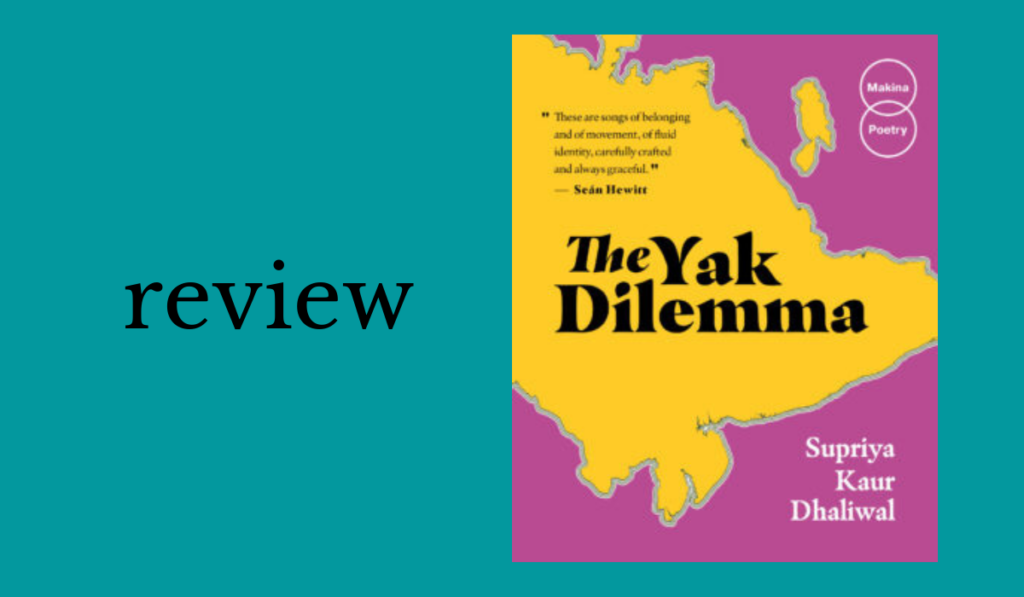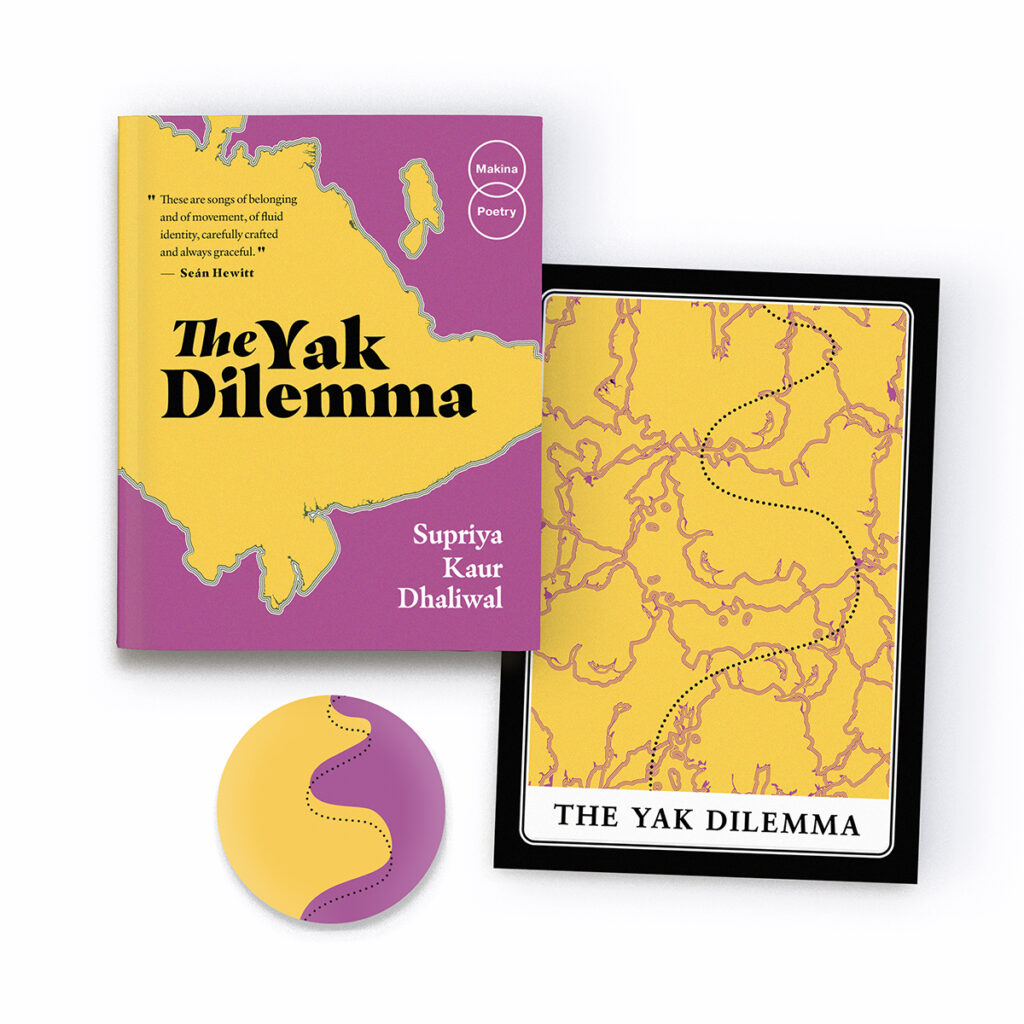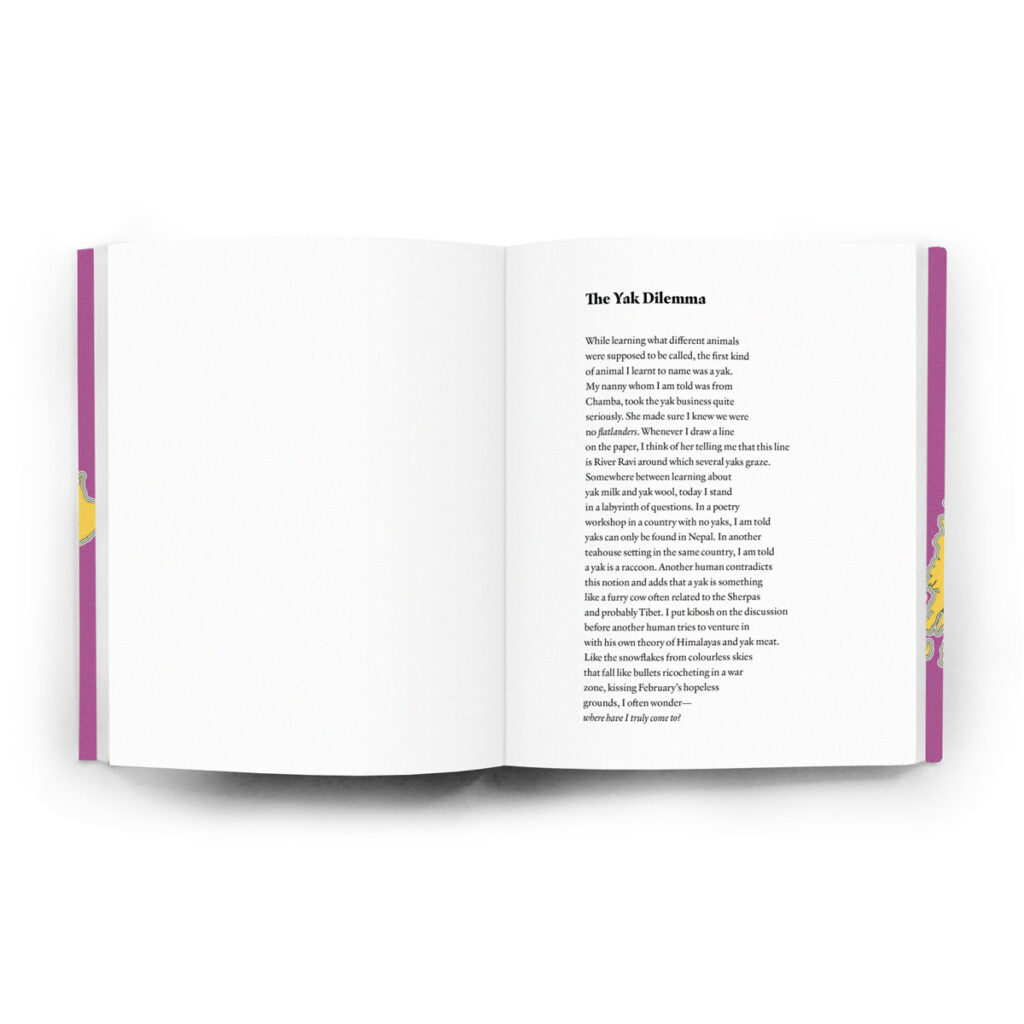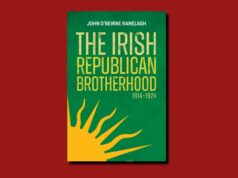
The Yak Dilemma|Supriya Kaur Dhaliwal|Makina Poetry 2021|ISBN:9781527271654|€12.50
Lind Grant-Oyeye reads The Yak Dilemma by Supriya Kaur Dhaliwal—and finds playful, sophisticated poetry which examines the familiar and strange, exploring the meaning of home.
Readers sometimes encounter books that encourage artistic voyeurism–a strong desire to accompany the narrator on their personal journey in real-time—an urge to experience the story for oneself. So it is with The Yak Dilemma by Supriya Kaur Dhaliwal (Makina Poetry, 2021), a collection of autobiographical poems which bring the reader on a journey across the world.
The Yak Dilemma is Dhaliwal’s first volume of poetry but she is by no means new to the Irish writing scene.
Her work has appeared in several literary magazines including Poetry Ireland Review and Banshee, she’s a Trinity graduate and a Wallace Charles Trust fellow.
Layered
The opening poem, “Meet me in the morning in no man’s land,” foreshadows later poems, giving insight into the non-restrictive nature of the work to specific cities or countries. The book positions cities such as Dublin and Edinburgh alongside the Himalayas, the childhood home of the poet.
Dhaliwal delivers her poems in layers like a Russian doll.
“Meet me in the morning in no man’s land” could be about a love interest, or about the search for racial justice, a yearning for some form of utopia. However, a third reading suggests a spiritual undertone—perhaps a resignation to fate, touching on the concept of life after death.
Playful sophistication
The author demonstrates sophistication in her writing by crafting clear yet ambiguous poetry for the reader to reach their own conclusions. After all, a compelling work of poetry is more about the reader than the writer.
The author also plays with form and style in this collection, such as in “Accidental sonnet” and “Ghazal on living in a Hotel in Downtown Cairo”. There is also a play on words and a focus on language in several poems. In “Undesigning K-25, Hauz Khas”, the autocorrect changes the narrator’s spelling of “Waris” to “War is”. Subsequent lines show Waris refers to Waris Shah; a well-known Punjabi poet. The author skillfully uses this pun to introduce a serious topic “it is war in our homes”.

Home
The book’s general theme relates to identity in various forms, including the concept of home and what it means.
In observing the swift move between cities and countries, with questions about what makes a home, one must resist viewing the narrator as lost or confused about their identity or their definition of home.
In the following lines, the narrator makes the case that ‘Four walls don’t make a home or a house—it takes some doing.’ As a reader who has experienced migration, I connect with this concept of what makes a home.
I have met migrants who describe the idea of home, not in the context of their country of birth or physical spaces, but places that hold significant memories.
It is possible for a migrant, when they mention home, to refer to a third country where they felt most settled socially and economically, and not necessarily where their ancestors lived. This varied description may include where an individual met their significant other or raised their children.

Familiar and strange
Keeping with the overarching theme of identity, it is not presumptuous to assume The Yak Dilemma is a metaphor for human experiences, such as what it means to be considered exotic—attributes ascribed to the Yak by those struggling to understand it. “The yak dilemma,” the eponymous poem inspired by an actual event, describes humorous but failed attempts at describing the animal, leading to the speaker putting an end to the conversation:
...I put kibosh on the discussion before another human tries to venture in with his own theory of Himalayas and yak meat.
While others described the animal in exotic terms, like a phenomenon, the first lines of the poem demonstrate how ordinary it is in the narrator’s world.
Through first-hand experience, I also understand that what is considered mundane or exotic depends on the observer and not the subject’s characteristics.
During a visit to a zoo in Europe, years back, I was surprised other visitors appeared excited to see the geckos, which are commonplace on the walls of homes in the part of Africa, where I had spent a considerable length of time. I was very curious to see the black bears. During a recent visit to a zoo, however, I was no longer intrigued by the bears, having received several visits from them, on my street, during a period I lived in North America.
Navigating experiences
Dhaliwal’s book is, however, less about animals and more about humans navigating various life experiences. It celebrates culture and allows the reader into a world where a Sadri has a place on the streets of western countries.
It is also a discourse on the interphase of diverse cultures in a single individual.
The author touches on gender-related issues through poems such as “Women, who dine alone, dine alone” and “Talking to Ghazala after The Republic of Ireland voted yes to Repeal the Eighth Amendment.”
The Yak Dilemma certainly has its strength in the ability to draw the reader into a world where the exotic could be as ordinary as a yak minding its own business in the Himalayas and the familiar— a naked man observed through a window in Antwerp, as mentioned in the poem, “For Vincent van Gogh; from Q-Park, Museumplei”.
Although it seems to contain a lot of experiences in one volume that might have been developed into several collections, the strength of the storytelling in poetry form makes it a seamless rather than chaotic read.

Lind Grant-Oyeye is a poet whose work has appeared in anthologies, literary magazines, and other curated poetry projects world wide. She is the recipient of several awards,such as the Ken Saro-Wiwa prize and the UHRSN human rights poetry prize. You can find her on Facebook.











